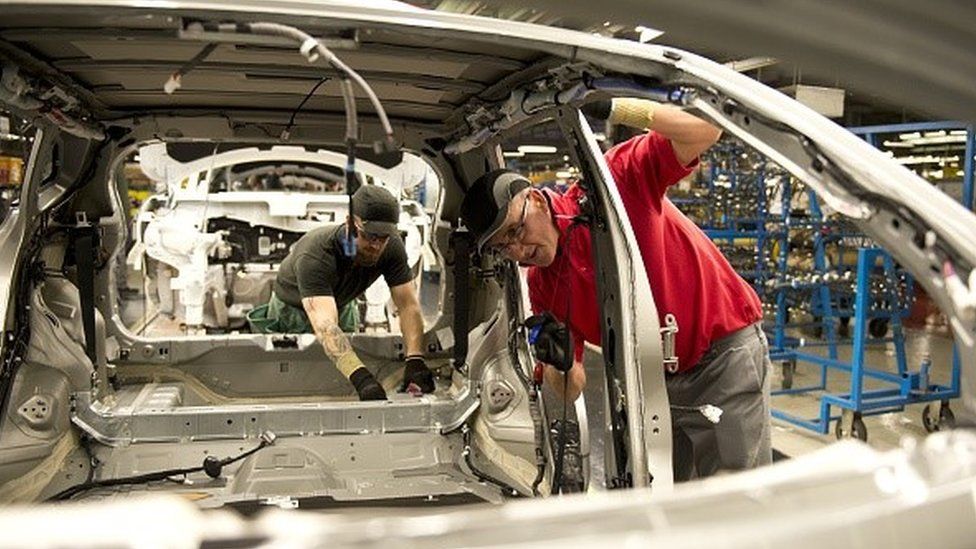UK car production slumps to lowest level since 1984
- Published
- comments

The number of new cars built in the UK last year fell by a third to just under 921,000, the lowest total since 1984, latest industry figures reveal.
Output was 920,928 vehicles, a 29.3% fall on 2019, rounding off a "dreadful year", Society of Motor Manufacturers and Traders chief Mike Hawes said.
Pandemic-enforced plant closures and falling consumer demand meant the worst output "in a generation", he said.
But he said the vaccine roll out and EU trade deal inspired optimism for 2021
Production for UK and export markets fell 30.4% and 29.1% respectively last year. Eight in ten UK-built cars still head overseas, which Mr Hawes said reinforced the importance of tariff-free trade with the EU.
The EU remained the UK's biggest export destination, taking a 53.5% share, despite volumes falling 30.8% to 400,460 units.
In December, output was down 2.3% to 71,403 vehicles, with some manufacturers, including Honda, affected by border closures and subsequent component supply issues.
Shipments to the US, Japan and Australia last year all fell, down 33.7%, 21.6% and 21.8% respectively. Exports to China, however, ended the year up 2.3%, and those to South Korea and Taiwan also rose 3.6% and 16.7% respectively as these nations travelled on different trajectories in dealing with the pandemic.
Despite the gloom, the UK continued to roll out battery electric, plug-hybrid and hybrid vehicles to buyers at home and around the world. Combined production of these models rose to 18.8% of all cars made in Britain, up from 14.8% a year before.
'Lowest ebb'
Mr Hawes said: "These figures, the worst in a generation, reflect the devastating impact of the pandemic... The industry faces 2021 with more optimism, however, with a vaccine being rolled out and clarity on how we trade with Europe, which remains by far our biggest market.
"The immediate challenge is to adapt to the new conditions, to overcome the additional customs burdens and regain our global competitiveness while delivering zero emission transport."
Independent forecasts say UK car production will partly recover in 2021 to one million, but Mr Hawes said much will depend on the continued impact of the virus, the speed with which showrooms can reopen, and how quickly manufacturers can come to terms with new trading arrangements with the EU, which he described as "much more complicated".
He hoped the latest figures reflected the "lowest ebb" for the industry, but added that significant investment would be needed to return to the figure of 1.7 million reported in 2016.
This is terrible news for car makers and workers, and in the old days when economic growth was the overriding indicator of a nation's success, it would be 100% bad.
But now climate change is also a priority, and some argue that requires a new perspective.
If fewer cars are bought, it's likely to mean fewer miles driven - and that's exactly what the Transport Secretary Grant Shapps says we need to combat climate change and air pollution (which is still produced even from electric car tyres and brakes).
The young are already shunning driving in favour of Uber in a trend that will swell if driverless taxis ever hit the road. Many city councils want green, calm streets with people walking and cycling on space taken back from cars.
Suppose a two-car family sells one and buys a bike: is this a fear, or an aspiration - or both?
Related Topics
- Published22 January 2021
- Published19 January 2021
- Published18 January 2021
- Published5 January 2021